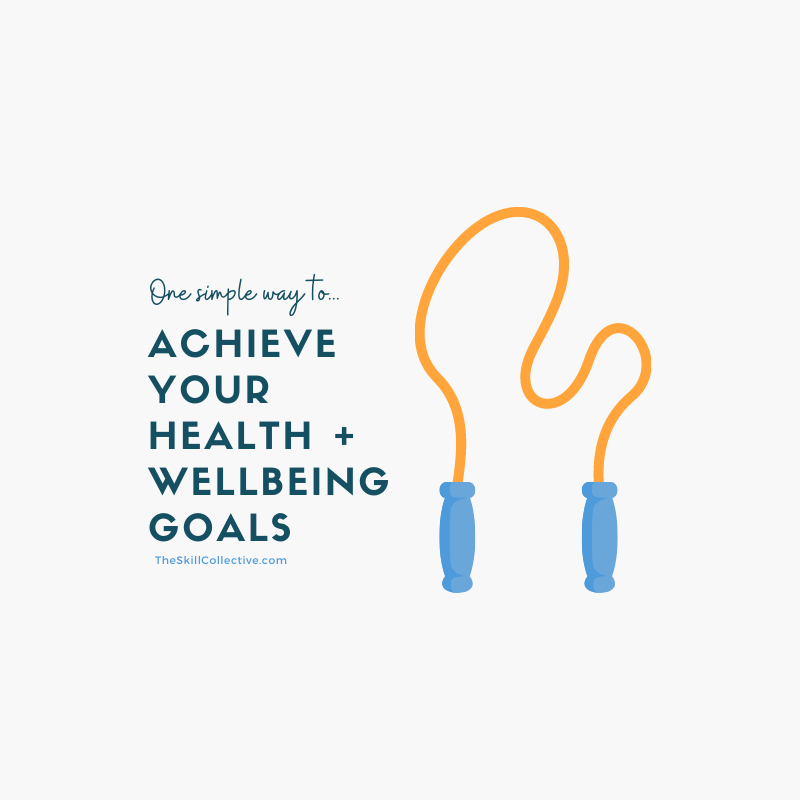ONE SIMPLE WAY TO ACHIEVE YOUR HEALTH AND WELLBEING GOALS
Another New Year has passed, and there's a chance that you've made some sort of New Year's resolution - or at least committed to making some goal to change. You’re not alone.
In a study by Norcross and colleagues [1], around 40% of individuals make a New Year’s Resolution, with many of these resolutions being related to health and wellbeing. The top 3 resolutions made included weight loss (31%), exercising more (15%) and quitting smoking (12%).
Other health and wellbeing goals to consider include:
Taking on the workplace team challenge to walk 10,000 steps
Looking after your health better if you have (or are at risk of) diabetes or heart disease
Fixing the dreaded tech neck and poor posture caused by prolonged mobile and computer usage
Boosting your fitness levels and toning up
Decideding to look after your wellbeing better so that you don’t burn out before the end of the year
Fallen off the health and wellbeing goals wagon already?
So, how are you tracking now that we’re more than halfway through January?
Well, in the same study by Norcross and colleagues, unfortunately over half of these individuals didn’t stick to their New Year’s Resolutions.
Sure, you may start off with the best intention, and follow a thorough process of goal setting (to learn more, read our blog post on How to Set Goals to Maintain Motivation and Stay on Track to set up these goals), including:
Setting goals by breaking them down into short, medium, and long term goals
Setting the right reward
Taking small steps
Planning around obstacles that may get in the way, and
Managing your expectations
…but somehow these goals just don’t seem to stick.
Why health and wellbeing goals and New Year's resolutions fail
Why is failure a real possibility in spite of your best attempts at setting yourself up for success?
Sometimes the answer is so simple that it’s staring you in the face. Or, rather, it’s not staring you in the face. That is, sometimes your goals may not stick simply because they’ve fallen off your radar. Out of sight, out of mind, that is.
In truth, that’s the reality of modern life and the stress that it causes. You get swamped by:
Juggling multiple commitments (work, study, friends, sport, book club, housework, parenting, caring for parents)
Shiny and noisy things competing for your attention (hello Instagram/Facebook/Twitter/Instagram, funny memes, and cat videos)
Urgent and important things (e.g. project deadlines, studying for exams and tests)
Sudden and unexpected things (e.g. being told in the morning that you’re speaking in the afternoon meeting).
When all of this is happening it’s typically health and wellbeing habits that fall off your radar.
Does this scenario sound familiar - you spend the morning putting out fires at work, getting interrupted by colleagues, emails pinging, or phone messages, and by mid-afternoon you realise that you haven’t drunk a glass of water, you’ve only eaten a muffin, and your energy levels are flagging?
What if you had a way of being reminded to look after your health and wellbeing?
The one simple way to achieve your health and wellbeing goals
One of the easiest ways to stick to your health and wellbeing goals is to keep them on your radar. It’s there, staring you in the face, badgering you to take action.
How can you keep things on your radar and hit your health and wellbeing goals? Check out these stunningly simple strategies:
Get an accountability partner (e.g. go for a walk with a colleague at lunch, sign up for yoga with a friend)
Set reminders on your phone (e.g. to stretch at your desk at regular intervals throughout the day)
Set Reminders to move either through your mobile or computer, or through a fitness tracker
Set up your environment so that there are visual reminders (e.g. keep your sneakers in plain sight, set up a water bottle in front of you
Use a planner/to do list. This is particularly helpful for people who are visual in nature - having a nice visual cue to stay focused on your health and wellbeing goals may be just the thing to raise your awareness.
If this is you, head on over to take a look at our Productive Life Planner, which includes a Daily Wellbeing tracker to help you keep track of your health and wellbeing goals (track your diet, moods, energy levels, sleep, exercise, water intake), and a Weekly Planner to help you track these health habits across the week. Keep it somewhere visible - it’s a great reminder to stay focused on your health and wellbeing goals.
And if you feel like you’d like some tailored help to turn goals into sustainable habits, you can book an appointment with one of our team.
REFERENCES
[1] Norcross, J.C., Mrykalo, M.S., & Blagys, M.D. (2002). Auld lang Syne: Success predictors, change processes, and self-reported outcomes of New Year's resolvers and non-resolvers. Journal of Clinical Psychology, 58, 397-405.










How can you counter the winter blues? Check out our tips on how to boost your wellbeing during the colder months.